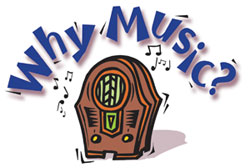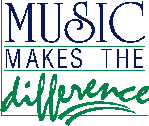

Why Should we Promote Music in the Schools?
One of your challenges as a music educator will be to maintain a healthy music program in your school and district. You will need to became actively involved in promoting your program to students, parents, community members, other teachers, your administration, and your school board. If you hope to keep your program alive and well, you not only have to "sell it" to your stakeholders, but you will need to understand how the study of music benefits your students. No doubt, you will be defending your music program before an audience of decision-makers. You will want to develop a rationale for your program based on research on the benefits of music education.
Research on the effects of music on emotions, academic achievement, and social development have been publicized. Current technological advancements in neuroscience have allowed us to view brain activity through brain scans. Research on brain-based learning and the multiple intelligences have informed us concerning how we learn. Performing music makes neural connections between various parts of the brain. Auditory and motor activities take place through playing an instrument. Rhythm and melody instruments require motor coordination. Reading music involves visual activity. Singing songs and recalling or reading lyrics activate language processing areas of the brain. Dancing or moving to the rhythm of music stimulates the brain's motor areas.
Research Resources for Music Education

![]() Read the
publication "Music Makes the Difference" from MENC: The National
Association for Music Education and the National Coalition - http://www.menc.org/networks/boosters/bssm/bssm.htm
These organizations can provide you with help as you work to build your music
programs. Excerpts from this MENC publication are included below:
Read the
publication "Music Makes the Difference" from MENC: The National
Association for Music Education and the National Coalition - http://www.menc.org/networks/boosters/bssm/bssm.htm
These organizations can provide you with help as you work to build your music
programs. Excerpts from this MENC publication are included below:
Music does make the difference. It affects people's lives, children's educations, and the quality of life in America's communities.
Music programs have often been in jeopardy nationwide. To counteract this trend, in March 1991, the National Commission on Music Education released a report titled Growing Up Complete: The Imperative for Music Education. The report examines the serious decline of music and the other arts and makes a strong case for the value of music and music education for all young people. Based on the commission's recommendations, MENC: The National Association for Music Education, NAMM: The International Music Products Association, and the National Academy of Recording Arts and Sciences, Inc. formed the National Coalition for Music Education to represent the music community—music educators, performers, and people in the music business. This unprecedented coalition has initiated a national campaign to promote music education in the schools.
And in 1994, MENC spearheaded the development of National Standards for music... useful benchmarks of progress toward a complete, balanced education for every student. To be successful, this campaign will need the energy and support of many people and organizations. Everyone is encouraged to join in the effort. Although the problems facing music education are national in scope, they are manifested locally. Interested persons must work together on the national, state, and local levels. Success will depend on communication, information, and determination. The National Coalition has produced a variety of materials, including this guide, to assist local music education advocacy groups in their efforts. The National Coalition also works with the states to form state coalitions, which may be able to provide local groups with valuable information.
Educational reform must grow from the roots up. Interested persons must present decision makers—school board members, administrators, legislators, and the general public—with compelling reasons for making music and the other arts an essential part of the school program. Music education advocacy groups must work to ensure that decision makers heed their advice and implement appropriate programs. The music community, together with arts advocates and parents of music students, are the people with the motivation and the expertise to spread the basic message: Just as there can be no music without learning, no education is complete without music.
Individuals, informal groups, and a few interested organizations have fought for years to maintain and improve the place of music in the public schools. In today's budgetary climate, however, sporadic and uncoordinated actions are not enough. Everyone in the music community—educators, performers, and people in the music business—needs to work in a concerted, consistent, and constant way toward the goal of music for every child. A sustained campaign is needed, a campaign active not only at the national level, but at the state and local levels, with groups of dedicated individuals working together.
Most decisions about the curriculum and budget in America are made at the state and local levels. So while the National Coalition for Music Education works on issues of importance to us all, advocacy groups must work to improve music education locally. All of us share several important goals and strategies and share knowledge of several important facts: